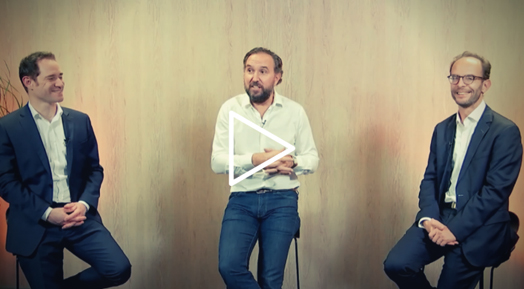INTERNATIONAL CEO AGENDA
Management Package: Covid is shuffling the deck
by Isabelle Cheradame, Managing Partner at Scotto Partners
and Christophe Leclerc, Partner at Accuracy

Covid has taken the world by surprise and its consequences on the global economy are massive. It has affected all businesses, with differing levels of severity depending on the industry, and who knows how far its reach will extend.
For management teams of private equity-backed businesses, Covid not only impacts them in their role as executives of the business, but also in their capacity as private investors: in many circumstances, there are repercussions for the management package (or management equity program, “MEP”) set by the financial advisor, which needs to be restructured to maintain alignment among the stakeholders and to ensure the motivation of key people.
Key points prior to restructuring a management package
Various boxes need to be ticked to restructure a MEP. First of all, the stakeholders need to be reassured that management has initiated all necessary actions to preserve the business and that the value has reached its lowest point and thus will start increasing again. In so doing, management is also establishing its legitimacy to remain at the head of the group and its key position for the future. Secondly, the business plan needs to be revised in terms of performance and exit horizon to reflect accurate assumptions
In the context of the process of a transaction, management prepares a business plan to convince potential acquirers of the management strategy and the company’s value creation potential. The transaction itself is the concrete sign of this agreement between all stakeholders. After any unexpected adverse impact on the value of the company, it is necessary to be able to adapt the strategy to the new economic environment and to translate it into a new business plan and value creation objectives. Not only is it fundamental for the company to give itself a new direction and new targets to employees, but it is also imperative that the company obtain shareholder agreement on these new elements. In other words, shareholders cannot be expected to revisit the MEP if they do not agree on the strategy and the value creation targets. However, to be able to discuss this new business plan, management needs to have a good understanding of Covid’s impact on the business over the medium term, which may be difficult in some industries (travel and hospitality, to name a few).
How to restructure a management package
The revised business plan enables the stakeholders to have a clearer view as to whether the group may face serious financial difficulties, and the possibility of a restructuring or a takeover of the share capital by the lenders, in which case the current equity, including MEP instruments, may no longer be in the money. Likewise, they can form an opinion as to whether the group’s performance will improve and whether the equity, including the MEP, may gain value again. Depending on these two scenarios, discussions and negotiations will take a different turn: there will either be the need to structure a completely new package or to add another layer onto the existing one. Also, it may be more appropriate to discuss with the current shareholder, or the banks, or even possibly a new shareholder.
With respect to the existing management package, it will be more or less likely to remain in the money depending on its structure: for example, a MEP based on a sweet equity mechanism, depending on the interest rate of the shareholder and the new exit horizon, may still enable its holders to capture value – or not. In the event of a ratchet mechanism, if the triggering performance criterion is based on the multiple of the project or the investors, the MEP may still be efficient, whereas in the event of an IRR criterion, it will most likely no longer deliver any value.
Regardless of whether the new MEP entirely replaces or merely completes the previous package, there are various questions to answer to best determine the appropriate structure: when will it generate value for its holders and on what will it be conditioned? Will it be granted at no cost or will it require [compensation/payment from managers]?
With respect to the first question, the triggering point and the structure will differ depending on the financial health of the business and on whether the negotiations are conducted with the current shareholders (who may at least expect to recover their investment), creditors (who will seek to incentivize management to reimburse their loans), or new shareholders (who are not impacted by past investment or loans). In some cases, the structuring might become complex to accommodate different stakeholders’ objectives.
Regarding the second question, obviously it is hard to ask managers to put additional money on the table when their previous investment has lost part or all of its value and has only little chance, if at all, to generate value in the future. When contemplating free investment plans, France offers an interesting tool with its qualifying “free shares scheme”: subject to meeting certain requirements (notably the holding period), this incentive, although granted at no cost for managers, benefits from a specific tax and social security regime that is more attractive than granting a bonus. The company will be required to pay social contributions, but they will be due and calculated on the date at which these shares are issued to beneficiaries (usually one year after the initial grant) and not upon the date of disposal, and managers can benefit from capital gain taxation upon disposal of the shares. Due to this difference in timing between the issuing of the shares and the payment of the social contribution, the timing for implementing the free shares scheme is crucial: if implemented too late, the recovery in the business and in the company value might be well engaged at the acquisition date and the cost for the company could be higher than expected.
Under this incentive scheme, executives may be granted ordinary shares, but also preferred shares that can replicate a MEP: they can be structured with specific financial rights conditioned upon reaching certain performance thresholds, such as the sponsor’s IRR or multiple. Where this free shares scheme cannot be implemented, the other alternative will be to set up a bonus incentive scheme. This alternative provides more flexibility in terms of conditions and basis for calculating such bonus, but it is obviously less optimized for both the employer and employee (and particularly costly in France, given that social contributions are uncapped).
Where managers are required to pay for their MEP securities, the key point is for this acquisition to occur at fair market value, to avoid any challenge of the capital gain taxation. In order to benefit from an incentive in the form of sweet equity effect, the acquisition of ordinary shares is likely to remain costly (or if the value is very low, still risky). The ratchet mechanism enables stakeholders to structure an incentive that will usually be less, and sometimes even far less, expensive to acquire.
In all scenarios involving equity instruments that entitle their holders to benefit from capital gain treatment upon exit, the valuation of these instruments is absolutely key. The tax authorities will want to review a MEP in cases where the exit was successful and the MEP generated good returns for managers. In this case, it is critical for the parties involved to be able to support the accuracy of the value paid for the instruments, [using/providing] well-documented valuation reports to the authorities. Indeed, the valuation of a MEP in the context of a crisis is more complex than it was pre-Covid. It is not incorrect to claim that businesses should account for the actual equity value destruction related to the Covid crisis and its associated uncertainties. However, as illustrated by the recovery of the financial markets since their lowest level, value can be generated back more quickly than under normal conditions, and that should not be underestimated in the valuation of a MEP.
As usual, assessing the appropriate issues and priorities given the MEP case at hand, whether relating to the valuation of the group or the securities, to the financial security and upside of the newly structured scheme or to the tax treatment and risks, require that stakeholders and in particular management be properly advised, otherwise the new incentive could turn into a new crisis.


